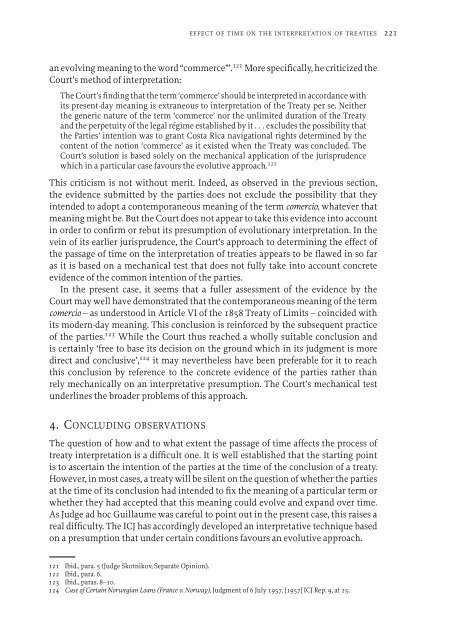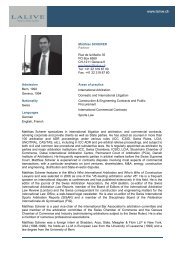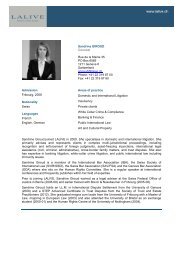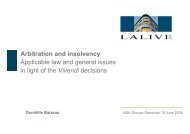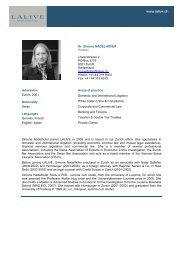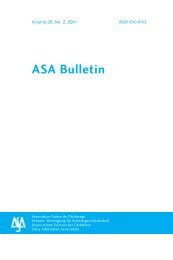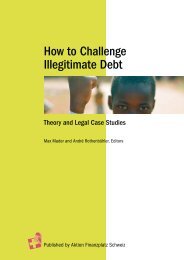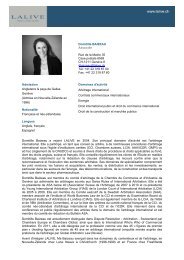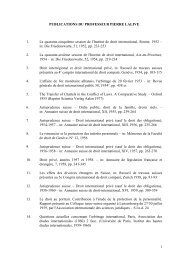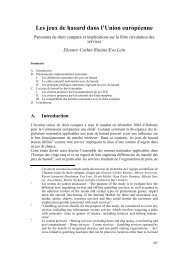The Effect of the Passage of Time on the Interpretation of Treaties ...
The Effect of the Passage of Time on the Interpretation of Treaties ...
The Effect of the Passage of Time on the Interpretation of Treaties ...
Create successful ePaper yourself
Turn your PDF publications into a flip-book with our unique Google optimized e-Paper software.
EFFECT OF TIME ON THE INTERPRETATION OF TREATIES 221<br />
an evolving meaning to <str<strong>on</strong>g>the</str<strong>on</strong>g> word “commerce”’. 121 More specifically, he criticized <str<strong>on</strong>g>the</str<strong>on</strong>g><br />
Court’s method <str<strong>on</strong>g>of</str<strong>on</strong>g> interpretati<strong>on</strong>:<br />
<str<strong>on</strong>g>The</str<strong>on</strong>g> Court’s finding that <str<strong>on</strong>g>the</str<strong>on</strong>g> term ‘commerce’ should be interpreted in accordance with<br />
its present-day meaning is extraneous to interpretati<strong>on</strong> <str<strong>on</strong>g>of</str<strong>on</strong>g> <str<strong>on</strong>g>the</str<strong>on</strong>g> Treaty per se. Nei<str<strong>on</strong>g>the</str<strong>on</strong>g>r<br />
<str<strong>on</strong>g>the</str<strong>on</strong>g> generic nature <str<strong>on</strong>g>of</str<strong>on</strong>g> <str<strong>on</strong>g>the</str<strong>on</strong>g> term ‘commerce’ nor <str<strong>on</strong>g>the</str<strong>on</strong>g> unlimited durati<strong>on</strong> <str<strong>on</strong>g>of</str<strong>on</strong>g> <str<strong>on</strong>g>the</str<strong>on</strong>g> Treaty<br />
and <str<strong>on</strong>g>the</str<strong>on</strong>g> perpetuity <str<strong>on</strong>g>of</str<strong>on</strong>g> <str<strong>on</strong>g>the</str<strong>on</strong>g> legal régime established by it ...excludes <str<strong>on</strong>g>the</str<strong>on</strong>g> possibility that<br />
<str<strong>on</strong>g>the</str<strong>on</strong>g> Parties’ intenti<strong>on</strong> was to grant Costa Rica navigati<strong>on</strong>al rights determined by <str<strong>on</strong>g>the</str<strong>on</strong>g><br />
c<strong>on</strong>tent <str<strong>on</strong>g>of</str<strong>on</strong>g> <str<strong>on</strong>g>the</str<strong>on</strong>g> noti<strong>on</strong> ‘commerce’ as it existed when <str<strong>on</strong>g>the</str<strong>on</strong>g> Treaty was c<strong>on</strong>cluded. <str<strong>on</strong>g>The</str<strong>on</strong>g><br />
Court’s soluti<strong>on</strong> is based solely <strong>on</strong> <str<strong>on</strong>g>the</str<strong>on</strong>g> mechanical applicati<strong>on</strong> <str<strong>on</strong>g>of</str<strong>on</strong>g> <str<strong>on</strong>g>the</str<strong>on</strong>g> jurisprudence<br />
which in a particular case favours <str<strong>on</strong>g>the</str<strong>on</strong>g> evolutive approach. 122<br />
This criticism is not without merit. Indeed, as observed in <str<strong>on</strong>g>the</str<strong>on</strong>g> previous secti<strong>on</strong>,<br />
<str<strong>on</strong>g>the</str<strong>on</strong>g> evidence submitted by <str<strong>on</strong>g>the</str<strong>on</strong>g> parties does not exclude <str<strong>on</strong>g>the</str<strong>on</strong>g> possibility that <str<strong>on</strong>g>the</str<strong>on</strong>g>y<br />
intended to adopt a c<strong>on</strong>temporaneous meaning <str<strong>on</strong>g>of</str<strong>on</strong>g> <str<strong>on</strong>g>the</str<strong>on</strong>g> term comercio, whatever that<br />
meaning might be. But <str<strong>on</strong>g>the</str<strong>on</strong>g> Court does not appear to take this evidence into account<br />
in order to c<strong>on</strong>firm or rebut its presumpti<strong>on</strong> <str<strong>on</strong>g>of</str<strong>on</strong>g> evoluti<strong>on</strong>ary interpretati<strong>on</strong>. In <str<strong>on</strong>g>the</str<strong>on</strong>g><br />
vein <str<strong>on</strong>g>of</str<strong>on</strong>g> its earlier jurisprudence, <str<strong>on</strong>g>the</str<strong>on</strong>g> Court’s approach to determining <str<strong>on</strong>g>the</str<strong>on</strong>g> effect <str<strong>on</strong>g>of</str<strong>on</strong>g><br />
<str<strong>on</strong>g>the</str<strong>on</strong>g> passage <str<strong>on</strong>g>of</str<strong>on</strong>g> time <strong>on</strong> <str<strong>on</strong>g>the</str<strong>on</strong>g> interpretati<strong>on</strong> <str<strong>on</strong>g>of</str<strong>on</strong>g> treaties appears to be flawed in so far<br />
as it is based <strong>on</strong> a mechanical test that does not fully take into account c<strong>on</strong>crete<br />
evidence <str<strong>on</strong>g>of</str<strong>on</strong>g> <str<strong>on</strong>g>the</str<strong>on</strong>g> comm<strong>on</strong> intenti<strong>on</strong> <str<strong>on</strong>g>of</str<strong>on</strong>g> <str<strong>on</strong>g>the</str<strong>on</strong>g> parties.<br />
In <str<strong>on</strong>g>the</str<strong>on</strong>g> present case, it seems that a fuller assessment <str<strong>on</strong>g>of</str<strong>on</strong>g> <str<strong>on</strong>g>the</str<strong>on</strong>g> evidence by <str<strong>on</strong>g>the</str<strong>on</strong>g><br />
Court may well have dem<strong>on</strong>strated that <str<strong>on</strong>g>the</str<strong>on</strong>g> c<strong>on</strong>temporaneous meaning <str<strong>on</strong>g>of</str<strong>on</strong>g> <str<strong>on</strong>g>the</str<strong>on</strong>g> term<br />
comercio – as understood in Article VI <str<strong>on</strong>g>of</str<strong>on</strong>g> <str<strong>on</strong>g>the</str<strong>on</strong>g> 1858 Treaty <str<strong>on</strong>g>of</str<strong>on</strong>g> Limits – coincided with<br />
its modern-day meaning. This c<strong>on</strong>clusi<strong>on</strong> is reinforced by <str<strong>on</strong>g>the</str<strong>on</strong>g> subsequent practice<br />
<str<strong>on</strong>g>of</str<strong>on</strong>g> <str<strong>on</strong>g>the</str<strong>on</strong>g> parties. 123 While <str<strong>on</strong>g>the</str<strong>on</strong>g> Court thus reached a wholly suitable c<strong>on</strong>clusi<strong>on</strong> and<br />
is certainly ‘free to base its decisi<strong>on</strong> <strong>on</strong> <str<strong>on</strong>g>the</str<strong>on</strong>g> ground which in its judgment is more<br />
direct and c<strong>on</strong>clusive’, 124 it may never<str<strong>on</strong>g>the</str<strong>on</strong>g>less have been preferable for it to reach<br />
this c<strong>on</strong>clusi<strong>on</strong> by reference to <str<strong>on</strong>g>the</str<strong>on</strong>g> c<strong>on</strong>crete evidence <str<strong>on</strong>g>of</str<strong>on</strong>g> <str<strong>on</strong>g>the</str<strong>on</strong>g> parties ra<str<strong>on</strong>g>the</str<strong>on</strong>g>r than<br />
rely mechanically <strong>on</strong> an interpretative presumpti<strong>on</strong>. <str<strong>on</strong>g>The</str<strong>on</strong>g> Court’s mechanical test<br />
underlines <str<strong>on</strong>g>the</str<strong>on</strong>g> broader problems <str<strong>on</strong>g>of</str<strong>on</strong>g> this approach.<br />
4. CONCLUDING OBSERVATIONS<br />
<str<strong>on</strong>g>The</str<strong>on</strong>g> questi<strong>on</strong> <str<strong>on</strong>g>of</str<strong>on</strong>g> how and to what extent <str<strong>on</strong>g>the</str<strong>on</strong>g> passage <str<strong>on</strong>g>of</str<strong>on</strong>g> time affects <str<strong>on</strong>g>the</str<strong>on</strong>g> process <str<strong>on</strong>g>of</str<strong>on</strong>g><br />
treaty interpretati<strong>on</strong> is a difficult <strong>on</strong>e. It is well established that <str<strong>on</strong>g>the</str<strong>on</strong>g> starting point<br />
is to ascertain <str<strong>on</strong>g>the</str<strong>on</strong>g> intenti<strong>on</strong> <str<strong>on</strong>g>of</str<strong>on</strong>g> <str<strong>on</strong>g>the</str<strong>on</strong>g> parties at <str<strong>on</strong>g>the</str<strong>on</strong>g> time <str<strong>on</strong>g>of</str<strong>on</strong>g> <str<strong>on</strong>g>the</str<strong>on</strong>g> c<strong>on</strong>clusi<strong>on</strong> <str<strong>on</strong>g>of</str<strong>on</strong>g> a treaty.<br />
However, in most cases, a treaty will be silent <strong>on</strong> <str<strong>on</strong>g>the</str<strong>on</strong>g> questi<strong>on</strong> <str<strong>on</strong>g>of</str<strong>on</strong>g> whe<str<strong>on</strong>g>the</str<strong>on</strong>g>r <str<strong>on</strong>g>the</str<strong>on</strong>g> parties<br />
at <str<strong>on</strong>g>the</str<strong>on</strong>g> time <str<strong>on</strong>g>of</str<strong>on</strong>g> its c<strong>on</strong>clusi<strong>on</strong> had intended to fix <str<strong>on</strong>g>the</str<strong>on</strong>g> meaning <str<strong>on</strong>g>of</str<strong>on</strong>g> a particular term or<br />
whe<str<strong>on</strong>g>the</str<strong>on</strong>g>r <str<strong>on</strong>g>the</str<strong>on</strong>g>y had accepted that this meaning could evolve and expand over time.<br />
As Judge ad hoc Guillaume was careful to point out in <str<strong>on</strong>g>the</str<strong>on</strong>g> present case, this raises a<br />
real difficulty. <str<strong>on</strong>g>The</str<strong>on</strong>g> ICJ has accordingly developed an interpretative technique based<br />
<strong>on</strong> a presumpti<strong>on</strong> that under certain c<strong>on</strong>diti<strong>on</strong>s favours an evolutive approach.<br />
121 Ibid., para. 5 (Judge Skotnikov, Separate Opini<strong>on</strong>).<br />
122 Ibid., para. 6.<br />
123 Ibid., paras. 8–10.<br />
124 Case <str<strong>on</strong>g>of</str<strong>on</strong>g> Certain Norwegian Loans (France v. Norway), Judgment <str<strong>on</strong>g>of</str<strong>on</strong>g> 6 July 1957, [1957] ICJ Rep. 9, at 25.


